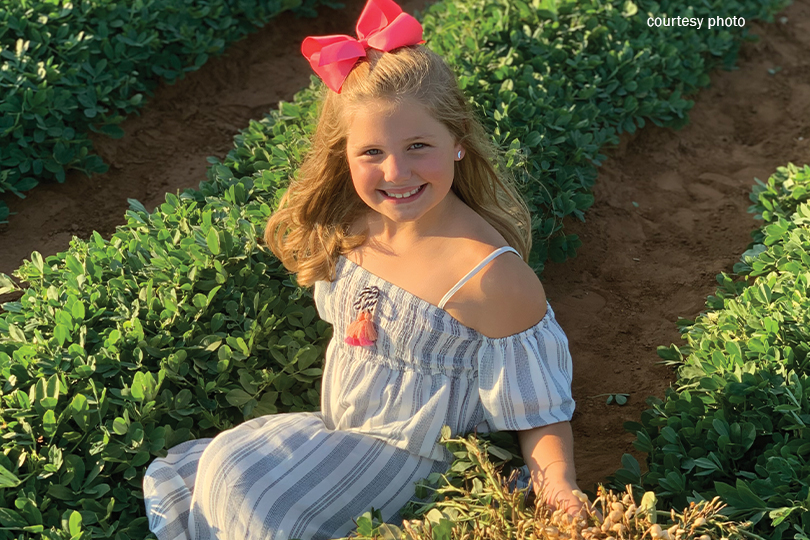By Jennifer Dorsett
Field Editor
Today, Landri Furgeson is just like any other young girl. She’s happy and full of energy.
It’s a normalcy her parents were unsure she’d ever see, thanks to a severe peanut allergy Landri was diagnosed with as an infant.
The diagnosis was a blow to the young family who grows peanuts in the sandy soil of several counties across the South Plains.
“This was such a life-changing experience,” Landri’s mother, Traci, said. “We’ve been growing peanuts with my brother and sister-in-law since 2010, and Landri was born on Aug. 18, 2012. I noticed she had really bad eczema, but being a first-time mom, I wasn’t sure if I was overreacting or not. She was six weeks old when we started digging peanuts and harvesting, and it turns out she was having allergic reactions to the peanut dust.”
When Landri was six months old, Traci said she scratched herself continually and had bouts of severe vomiting. Their pediatrician sent them to a dermatologist for the eczema, and the dermatologist, suspecting a food allergy, set them up with an allergist.
“I had never given her peanuts, peanut butter or anything else with peanuts in it at that point,” Traci said. “She was just starting baby food, and I felt terrible because, at first, we thought it was something we were feeding her.”
But after the allergist ran some blood tests, they found out Landri had multiple food allergies, including peanuts.
“Peanuts and eggs were the top two allergens, and that’s when I thought, ‘Okay, that makes perfect sense,’” Traci said. “Because her highest reactions were when we were harvesting peanuts. We just didn’t realize it at the time.”
After the diagnosis, Landri’s father, Anthony, would take extra precautions to not bring peanut dust into the house.
But the severity of their daughter’s allergy was a constant source of worry for Traci and Anthony.
“It really did scare us,’” Traci said. “We had to sort of educate our family to help them understand the severity of the situation, that she absolutely could not be around peanuts. At all.”
It was an odd stance to have to take for a family who grows peanuts.
“We grew up eating peanuts and having mixed nuts while riding in the truck checking water. My granddad kept a big can of shelled peanuts in the truck because they’re a healthy snack,” Traci said. “And it’s this thing that we farm. We have the equipment to farm peanuts. It’s obviously expensive equipment, and we’re talking about 2,000 acres of peanuts. One of the doctors said to us, ‘Can’t you just quit farming that?’ But it’s not that easy.”
In 2014, Traci started looking for options for kids with severe food allergies.
“I kept seeing ‘OIT’ popping up on social media forums, and I had no idea what that was. But I started searching and found a doctor in Dallas that did OIT, and that led us to a doctor north of San Antonio who offered the treatment.”
Oral immunotherapy (OIT) is a treatment method in which patients are given increasing amounts of an allergen with the goal of increasing the threshold that triggers an allergic reaction.
So, the family embarked on a new journey when Landri was around four years old, traveling to San Antonio every Monday to receive the next “up-dose” at the doctor’s office. The six-hour trip had to be made by car. Landri’s allergy was so severe, traveling by plane was risky, because there was no guarantee she wouldn’t be exposed to an allergen on the plane.
She continued the same dosage at home throughout the remainder of the week, then returned to the doctor’s office the following Monday for the next increase.
Traci stressed Landri’s was an individualized treatment plan, and each family’s journey will be different.
“We started with a liquid, then moved to peanut powder and eventually peanuts,” she said. “It took us about seven-and-a-half months to get to where she could eat 24 peanuts in one sitting.”
It was a momentous occasion for the family when Landri ate all 24 peanuts at once with zero reaction.
“She finished around Oct. 20 that year, and we got to deliver supper to the farm and not worry about Landri having a reaction to the peanut dust in the field,” Traci said. “It was so fun to do something that every other farm kid would think is no big deal. I still get goosebumps when I think about her being able to just sit there and watch her daddy drive the tractor, because she was finally getting the full farm kid experience.”
Landri now eats 12 peanuts a day as a maintenance dose.
“That’s her medicine,” Traci said. “She eats it in many forms. Right now, her favorite is Reese’s. We’ve found chocolate peanut butter, honey peanut butter, Reese’s peanut butter cups…we just try to make it fun, because she literally has to eat that every day to keep her allergy in check. Her eczema is clearer now and nearly gone. I feel like her numbers drop drastically every time we get bloodwork done, so I know this is working. Her blood markers for peanuts were over 100, and they’re down to about 30 now, which is still pretty high. But I feel like we can handle something like this, whereas before I was so worried all the time.”
And now the Fergusons get to enjoy PB&Js, a drive through the peanut fields and a lifetime of exploring new adventures.

